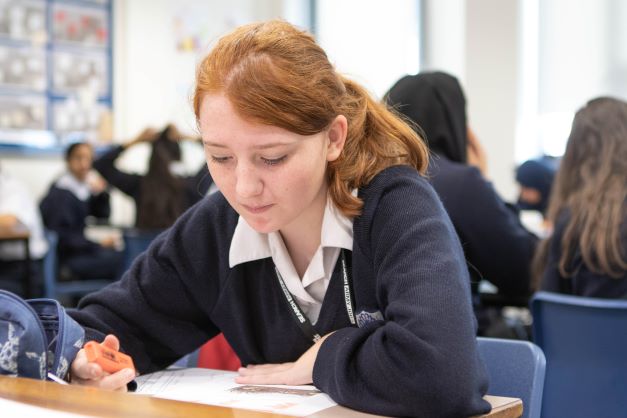Mathematics

Head of Department: Mr T Farahmand
Mathematics is a universal language that has been carefully constructed by mathematicians over many years. The math's curriculum we follow at Reading Girls’ School has been carefully designed by ‘Complete Mathematics’ to allow for our students to be exposed to and learn mathematics in an order which is coherent and at a pace correct for each learner. This means starting where the students need to start on the curriculum and moving forward only when the prerequisite knowledge is in place to allow for long-term success.
This approach allows teachers to plan and deliver the most appropriate lessons for their learners and allows our students to be successful in the subject assuming they work hard and engage in their lessons.
On entry in year 7 students will be assessed using ‘Complete Mathematics’ which will allow us to place each student in the correct class for them and decide their starting point on the curriculum.
The starting point on the curriculum for a student entering year 7 with a scaled score of 115+ (above average) would start at ‘stage 7’ on the curriculum and progress through the stages over the 5 years of secondary school. If a student enters with a lower scaled score, they will start at an earlier stage on the same curriculum depending on their pre-requisite knowledge.
Our curriculum is one coherent journey through Mathematics designed by ‘Complete Mathematics’ so the ability to condense this to one page is not possible. If you would like to know where your child is at on their mathematical journey, please ask them to login to their ‘Complete Math's’ account and show you their most recent lesson objectives, quiz results and next steps to improve.
Homework and Assessment
Weekly tasks will be set using Complete Math's Classroom where students will complete retrieval and/or prerequisite quizzes to support the learning in the classroom. This data will feed directly into the teachers' planning, so it is important that it is a true reflection of the students' knowledge.
Additionally, students will be assessed during lessons using the computer facilities in school to again allow students to retrieve previously learnt content and test prerequisite knowledge to inform the planning of future lessons which are specific to each class.
‘End-of-year' assessments will be given once per academic year in KS3 and twice in KS4, followed by carefully designed feedback lessons allowing students to make progress.
Content
We aim to inspire young people to enjoy math, to develop their thinking skills, to exceed their expectations in public examinations and to be functionally numerate in the workplace. For the current GCSE course pupils are assessed on their skills, knowledge and understanding in relation to number, algebra, geometry and measures, and statistics. The aims of the course are to enable pupils to:
- Develop knowledge, skills and understanding of mathematical methods and concepts
- Acquire and use problem-solving strategies
- Select and apply mathematical techniques and methods in mathematical, every day and real-world situations
- Reason mathematically, make deductions and inferences and draw conclusions
- Interpret and communicate mathematical information in various forms appropriate to the information and context.
The assessment papers are split into Higher and Foundation where the students on the higher tier can achieve grades 3-9 whereas the students on the foundation tier can achieve 1-5.
- Paper 1 – Non-Calculator
- Paper 2 – Calculator
- Paper 3 – Calculator
Each of the three assessment papers are out of 80 marks, two of which require a scientific calculator which can be purchased in regular supermarkets or through the school.
Homework
Homework is set weekly for both KS3 and KS4 students and can be both online (Dr Frost or Complete Maths) or on paper.
- KS3 expectation – up to 1 hour per week
- KS4 expectation – up to 1.5 hours per week
How Parents and Carers Can Support
- Ensure that your child has all the equipment they need, including a scientific calculator, ruler, protractor, and a pair of compasses.
- Keep rehearsing mental calculations, such as times tables, with them.
- Remain positive when talking about mathematics and point out where you use mathematics, whether in personal finance, at work or recreationally.
- Encourage your child to complete their homework without help from the internet or another person.
- Get your child to show you their most recent quiz results and discuss the questions they did not understand.
Additional Support Available/Useful Links
- https://www.drfrostmaths.com/
- http://www.mrbartonmaths.com/students/
- https://corbettmaths.com/
- www.mathsgenie.co.uk
- https://completemaths.com/classroom
Reading List
- Revision Guides and Workbooks for Edexcel GCSE Maths – CGP
- 17 Equations that Changed the World – Ian Stewart
- 1089 and All That – David Acheson
- How to Cut a Cake – Ian Stewart
